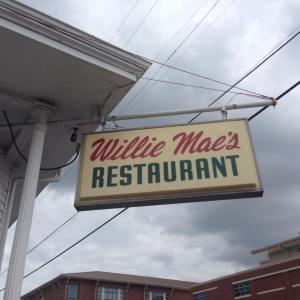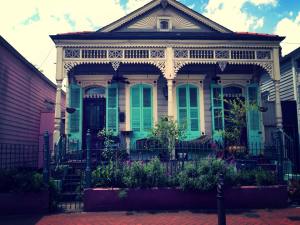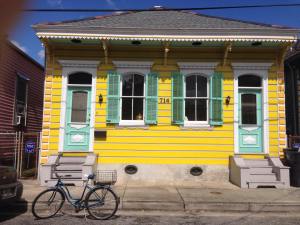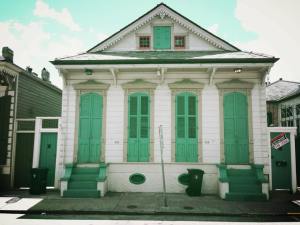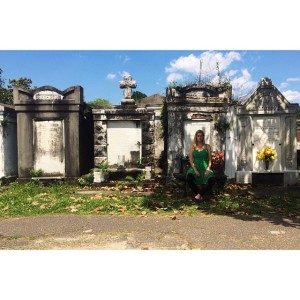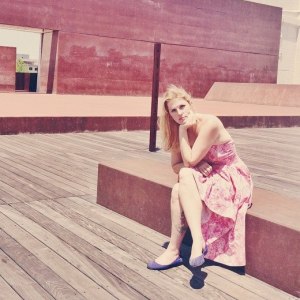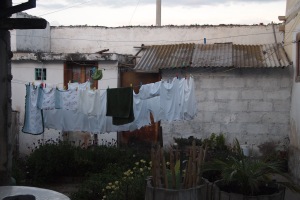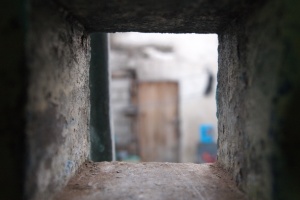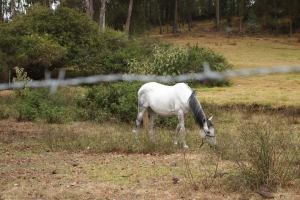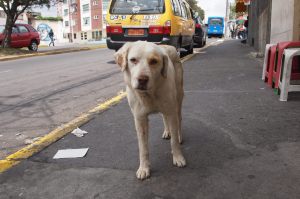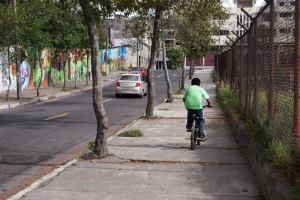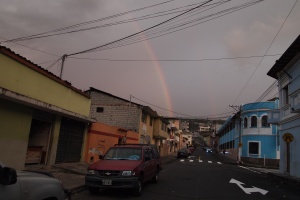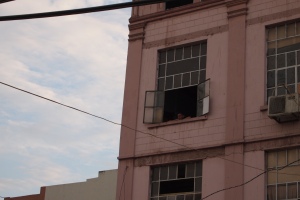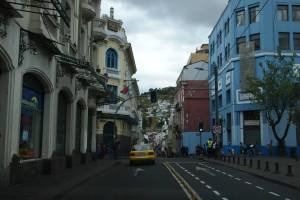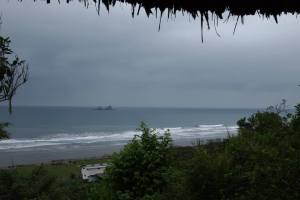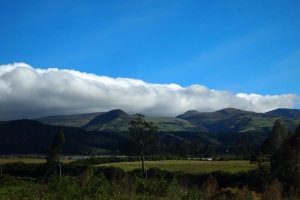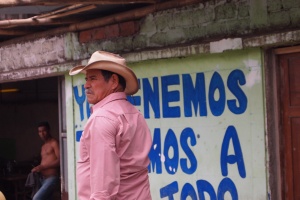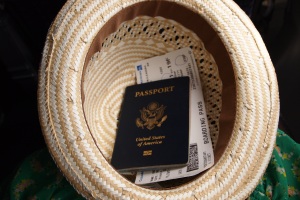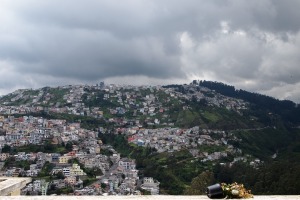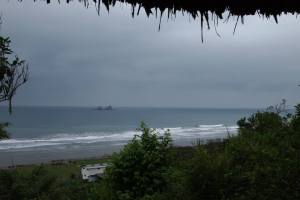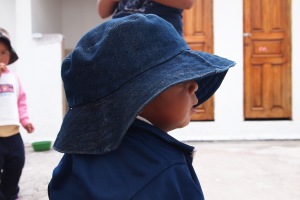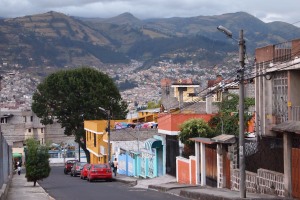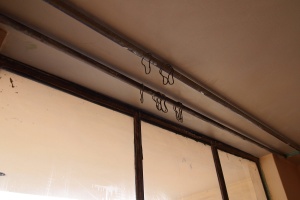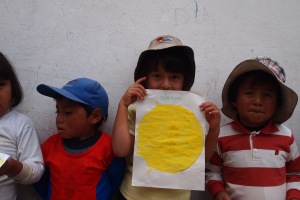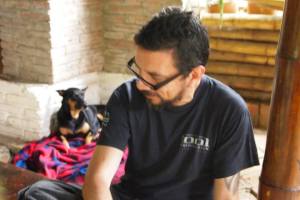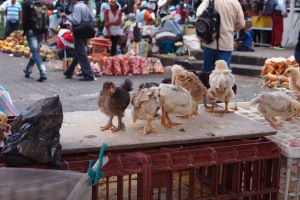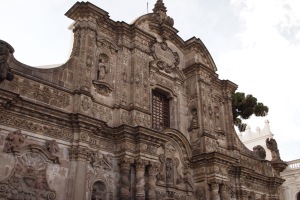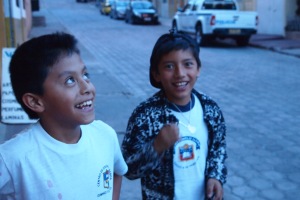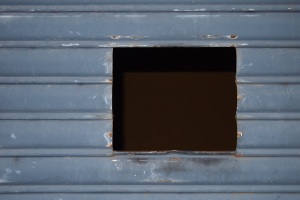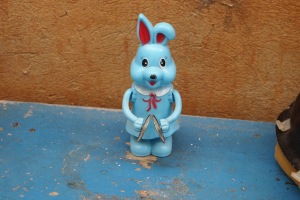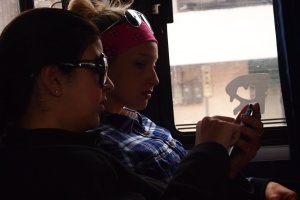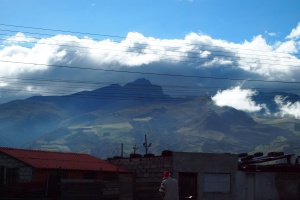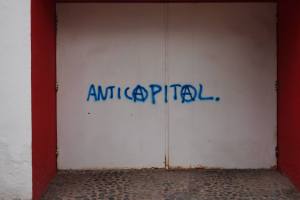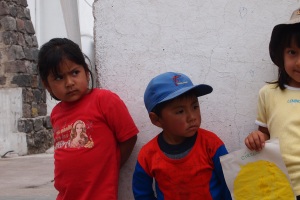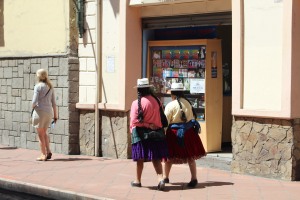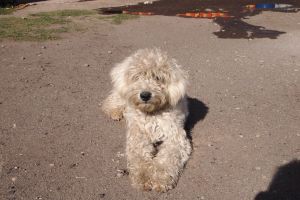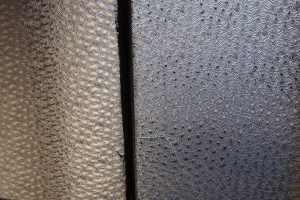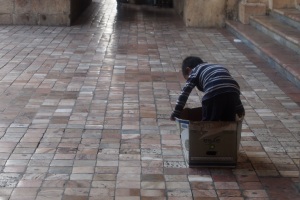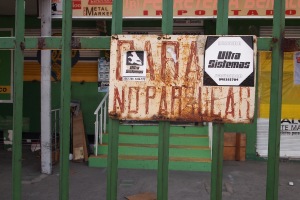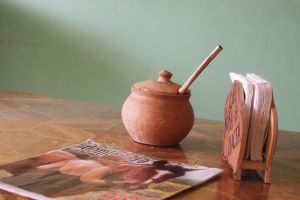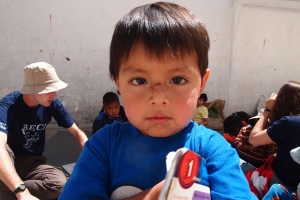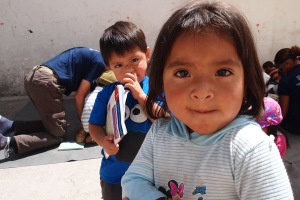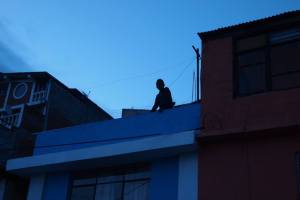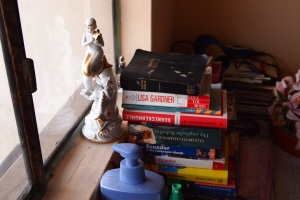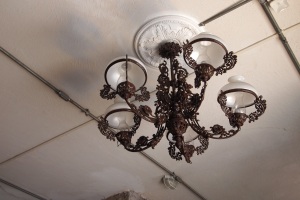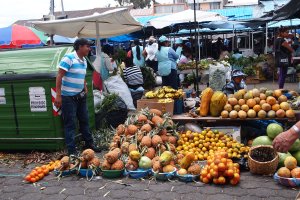I wandered away from the crowd of tourists, brown magnolia leaves broke apart under my shoes. I found an old stone bench hidden in a narrow walkway and sat down. The cemetery felt like an old sanctuary, its white tombs and crying angels sat quietly under a gloomy sky. Split concrete and overgrown weeds spread out over the soft flat earth. The names of the dead etched carefully in stone. I looked around and felt at home.
Tag Archives: Writing
Vivir con pasión
Winter had ended and what remained was a visceral fear of darkness that lingered. This fear demanded something of me. It necessitated a change that needed to occur. I understood this fear and listened to it closely. It was the only thing left that felt real.
Feeling rather morose, I decided that I was tired of procrastinating. The trip abroad that had been churning around in my mind for quite some time began to take shape. The shape had real edges. It was large. It was called Africa. I had always wanted to go to Africa.
Instead I traveled to South America. I flew above the Andes Mountains and the airplane I was on shook so violently that it had to be diverted to Guayaquil, a large city on the Pacific Coast. After several hours sitting on the tarmac, the plane took flight again. It made its decent into the heavy night and shook ever so slightly, then glided gently over the ocean, leaving behind glimmering lights and swaying palms.
My plane landed in Quito to cheers and sighs of relief. After several perplexing minutes with an irritated immigration official, I walked past customs and out the door into the chaos of arriving taxis and buses. I found my driver who had been waiting patiently for me, holding a small white sign with name, Lea. “Mucho gusto,” I said in broken Spanish, shaking his hand. “Mucho gusto,” he replied, perplexed. Opening the car door, I climbed in and threw my backpack to the side, stretching my back against the black vinyl seat. As I looked out the window into blackness, something mysterious whispered to me from the mountains. My need for sleep was instantly vanquished.
We sped past motorcycles and pickup trucks, weaving around traffic and dilapidated concrete houses. Street vendors cooked variations of meat, the scent of carne rose from the churrascos. A mangy dog limped out of the way and a small child kicked a soccer ball, sending it down a broken staircase. Car horns honked loudly and smoke wafted through an intersection.
After driving miles and miles into the night on the old highway, the car slowed on a steep quiet street in the middle of a dark neighborhood. I stepped out into the chilly air with my backpack in hand and looked out over the sprawling city, its mountains covered in shimmering lights. A dog barked and a door opened. A man walked out into the street and introduced himself. I smiled, feeling fully alive.
The next two weeks of my life consisted of looking after dozens of small children in a large market south of the city. We arrived early in the morning and set up tents in order to block out the sun. Inca music blasted from a nearby speaker while farmers began to set up their tables. Chickens and dogs mingled with children and women. Old men, sans teeth, laughed with their wives as they unloaded wheelbarrows full of naranjillas. Hundreds and hundreds of people came, bringing with them barrels of maíz and frijoles. I took a child in my hand and wandered around the immense market, marveling at the variations of fresh fruit and meat. Long sausages dangled from metal hooks. Dark red livers glistened in the morning heat. A filthy dog wrestled against a long brown rope. People talked and bartered and laughed.
While exploring the country, I attempted to climb my first volcano. I spoke Spanish and ate chicken hearts. I drank instant coffee Bordain style and sat in the back of pickups trucks as they sped rapidly up and down mountain roads. I discovered the sound of Julio Jaramillo and became even more mesmerized with the sound of the pan flute. Halfway through my second week of volunteer work, I reunited with an old friend. On a Saturday evening during the first week of September, we walked through the city to Fiesta de Guápulo. While walking slowly up an old staircase towards people and cars, sparklers and fireworks crackled and erupted, lighting up the night sky. I stood in front of an old bar and watched as a man with the most amazing swagger I had ever seen walked towards me. He came and stood to the right of me and began to speak. I fell in love. I left Ecuador and returned to Ecuador. On my return, we fell deeply in love and traveled together, danced together, sang together, laughed together, and worked together. We fell even more in love and then everything fell apart.
Dreams of California
When I was three years old, my family moved to Southern California. We settled into a rented three bedroom ranch on Zapata Avenue in Meri Mesa, thirty three miles from the U.S. Mexican border. Our neighborhood, surrounded cozily in between the hills of nearby Los Penasquitos Canyon, was quiet. The streets were lined with palms, and 1960s’ track homes, mostly small ranches. Nearly all of the homes were shades of sandy brown and white. Depending on the time of year, the yards varied in color from green to parched brown. Our front yard was filled with crushed white stone, no grass.
The alien landscape of Southern California was a departure for my parents, who managed to fly us across the country from their small town in Maine. Their church, The Bible Speaks, was experiencing a diaspora from members of their congregation located in Lenox, Massachusetts. My father had left the church after discovering widespread corruption, which was caused by the lead pastor. After confronting the pastor, who threatened my parents with retaliation, they decided to move far away. My parents were under the illusion that my father, who was a young pastor, would be able to start his own congregation in San Diego. Little did they know, the lead pastor back in Maine, who was one of the most powerful and charismatic pastor’s in New England, was never going to let that happen. The dream of California was vanquished before they even arrived.
After several years of problems within the church, my parents and several of their friends moved to California. My younger brother had just turned one when my parents left Maine. Unaware that the lead pastor and close members of the church had discovered my parents plans for California, my parents moved us into the ranch on Zapata Avenue. My father got a job driving trucks, where he would be gone for days delivering supplies, sometimes all the way out to Death Valley. Shortly after my father got his job, my parents found out that the pastor had flown to San Diego ahead of them. He contacted friends of theirs who were established church members near Meri Mesa. He spread a plethora of false information about my parents, deliberately harming them and their reputation. Their dream of starting their own church, and finally being free from the clutches of The Bible Speaks, died.
Without much money, but the support of their close friends, my parents struggled to decide whether or not to stay in California, or return to Maine. In the midst of trying to figure out what trajectory their lives would take, they tried to enjoy life. They took us to Dana Point, where we sat on the beach, watching the gentle waves. We drove up to Laguna and would sit for hours, enjoying a family picnic. The glistening sea stretched out endlessly for miles. My older sister and I would chase my baby brother across the sand on La Jolla, completely oblivious to the stress our parents were dealing with.
Once, they took us to the San Diego Zoo. We spent hours wandering around the lush gardens, enjoying the animal exhibitions. Apparently, I was so enamored by the flamingos that I didn’t want to leave. I stood, sucking my thumb, transfixed by the beautiful pink birds. My father later told me that I pleaded, to no avail, to ride in the Skyfari.
The days of sun and sand would fade away. My father and his good friend hatched a plan to open a small seafood restaurant in San Diego, but the plan didn’t work out. After months of worrying about what to do, my father decided to move us back to Maine. I suppose his decision was based primarily on our financial situation. I was too young to know how broken he was from the falling out with the church. My mother later told me that she wanted to stay. It is no wonder why I have issues with organized religion.
When we returned to Maine, my family moved into a small apartment building in Auburn. My father became a pastor at small church that him and his friend built near Lake Auburn. A few years later, our family left the church for good. We moved around quite a bit, and in 1992, moved to New Hampshire, where my dad began work at a cleaning company. Three years later, at the age of seventeen, I left home for California. I arrived in Los Angeles some time in the middle of the night, penniless and drunk. It was a strange, exhilarating rite of passage for me. Unfortunately, I ended up living on the streets for several months before returning to New England. Despite my aversion to cold weather, I always ended up back in New England.
Over the next three years, I traveled back and forth across the country to California. In the spring of 1998, I moved with a boyfriend to Berkeley, right near the border of Oakland. I got a job and settled into a small apartment with a few friends. Quickly, my California dream began to erode. Heavy drug use, and a penchant for escaping my neighborhood via bus, plane, and shopping cart, caused my fractured relationship with my boyfriend to fall apart. Needing to get away, I payed cash for a plane ticket, which was printed out by a small Middle Eastern man in a travel agency off Shattuck Avenue. I was nineteen, and flew down to San Diego to visit my aunt. I hadn’t been there since my parents moved, sixteen years earlier.
While staying with my aunt in Temeluca, she drove me past the neighborhood in Meri Mesa. I stared out at the endless track homes, unremarkable and modest, Edward Scissorhands land. Growing up, I imagined the place to be much different. Perhaps I had glamourized it, hoping if I ever returned, it would be as beautiful and mysterious as I had dreamt it would be. I left San Diego feeling sad and hollow. During the flight home, I wept. Despite living in the state that I adored, I was lost, and had no sense of place.
I arrived at the Oakland airport late at night and took the subway back to Ashby Avenue. Two months later, I left California and moved back to New England. I returned two years later to visit a friend in San Francisco. He lived on Polk Street, off Market Street. We woke up early and drank bloody marys at a nearby bar. At night, we danced to Lee Rocker at a Rockabilly bar downtown. He tried to talk me into staying, but like always, I left. A year later I flew to Los Angeles to see Social Distortion at the House of Blues. Two years later I returned to San Francisco on another trip with a boyfriend. I stayed a week. Six years ago, I traveled to the Redwoods for a wedding.
After a lifetime of being fascinated with California, it remains very much a part of me. I have been sober for thirteen years, and now work in the field of substance abuse. As a small child, I believe hidden somewhere in my subconscious was a dream that took root in my brain. It was a dream that was born on those beaches as a small child. I still dream of California.
Excerpt from “No Shoes.”
I had hitchhiked from New Hampshire to Georgia in two days, and my feet were beginning to show signs of boot rot. My penchant for cheap wine caused me to pass out quite frequently, and I often woke up wearing my boots. The combination of walking dozens of miles in the hot sun, and falling asleep with my boots on had caused my feet great discomfort. With every step, they sent shock waves of pain up my back. I had to sit down.
Sitting on a concrete curb in front of a small liquor store, I began to pull my left boot off my sweaty foot. Old blisters on the bottom of my toes had turned black. Freshly formed blisters sprung from the side of my foot, pulsating with pain. I gingerly removed a sweaty black sock, placing it on the curb next to me. I took off the other boot, examining my other foot. Smudges of dark pink skin in between my toes itched badly. My toe nails were dirty, and my feet smelled bad. I let them air out for a few minutes, the tar beneath my feet was black and hot. Broken glass lay strewn across the parking lot, near a busted dumpster. I pulled a cigarette from the pocket of my skirt and lit it with my Zippo. Taking a long drag, I waited patiently for Chelsea. People walked lazily walk up and down Moreland Avenue.
A few moments later, an old man came out of the liquor store holding a brown paper bag. He grinned at me, revealing a wide smile with three broken teeth. “Hola senorita,” he said, his bloodshot eyes fixated on my torn skirt. I glanced at him, squinting.“Hey man, can you spare any change?” I asked, looking up at him. The glare of the mid-afternoon sun hurt me eyes. “Que?” he asked, moving closer to me. He smelled of sweat and booze, his white tank top stained with old blood. “Do you have any money,” I asked, scratching my ankle. He grinned again and began coughing. Wiping spit away from his mouth, he smiled,“No, no dinero senorita.” He sat down on the curb next to me. I scooted over, nearly falling off the end of the curb. He grinned and gently pulled a bottle of MD 20/20 from the bag. Laughing, he put it back in the bag. “Quieres un poco de vino?” he asked, leering at me. He waved the bag in front of my face, his leathery brown face distored in a twisten grin. He waved his thin brown hands around his head as if he were drowning. His long fingers wrapped around the brown bag, revealing thick scars.I stared at him, perplexed. “I don’t know what the hell you just said, man. I am thirsty as hell, and need some change to get a drink,” I said, rubbing the bottom of my foot. “Drink!,” he yelled out exictedly.Twisting the plastic cap off the bottle, he took a long took a swig. “Ahhhh,” he smacked his lips. Sweat dripped down his jawline. “Muy bueno”, he gloated. Grinning, his stretched out his leathery arm and rubbed my shoulder.I stood up and grabbed my boots. “Oh! Senorita, don go,” he put a hand over his heart. Just then, a large black truck pulled into the parking lot, its wheels squealing. Chelsea jumped out of the passenger seat. “Fuck y’all!” she screamed, slamming the door shut. “Y’all are a bunch of dumb motherfuckers!” She kicked the side of the truck with a bare foot, nearly falling over. The truck revved its engine,squealing out of the small parking lot. She walkedtowards me fast, her jaw grinding. A thin cigarette hung from her lips. The old man began to laugh. “Esta loco,” he said, shaking his head. “Hey Chelsea,” I said, struggeling to get one of my boots on while standing up. She dropped a plastic bag on the ground and took a long drag, her right foot tapping the hot tar. “That fucker Roy ripped me off again. I told that fucker and his friend that I don’t do this shit for free,” she shouted, her hand moved quiclky through a tangle of long brown hair. “That totally sucks,” I replied glumly. “Yeah, well I ain’t doin shit for them ever again,” she said, pulling a pair of plastic flip flops from her bag. The old man leaned to his side, cooing at her. She rubbed the top of his head, a shock of greasy black hair. “You met Miguel?” she asked. I shook my head. “He’s an ole dog, but harmless. Ain’t ya,” she said, flicking her cigarette. The old man took another pull from his bottle. He began to hum. “How do you know him?” I asked. “He hangs around, hittin on young girls, “she said, digging around the pockets of her jean shorts. They hung loosly around her bony hips. “Why am I not surprised,”I grumbled, lacing up my boots. “He ain’t never hurt a fly,” she said, elbowing Miguel. Laughing, he put the bottle to his lips again.
Tupelo
Tupelo
We had been sitting at the bus station for the better part of the day when a blue Chevy Malibu slowed down beside us, stopping. It was a 2-door coupe that had seen better days. The passenger side window rolled down, revealing a middle aged woman. A long tan arm hung out the window. “Y’all OK?” she hollered. Nick made his way over to the car. I hung back, reluctant to talk to strangers. I’d spent most of the day resting against the concrete back end of the bus station. The heat had turned us into zombies. Our bodies moved slowly, interrupted only by the smallest of interactions. Earlier in the day a couple of black kids came by with bags of fast food for us. They’d alerted the fire department that we were hanging around the bus station without any food. Soon after, a firetruck armed with men carrying bags of Krystal Burger came to our rescue. After eating a burger and fries, I nearly passed out from the food coma which only intensified with the afternoon heat. I didn’t feel like moving around much.
I looked over at the woman in the car.
Nick walked over to the open window and crouched down.
“Yeah, we’re alright.”
“Ya’ll don’t look alright,” she swatted at a large bug. “It’s hotter n hell out here. Where y’all from?” the woman asked, peering, her black coal eyes bloodshot.
“Georgia. My friend and I are stuck at this bus station. We are hoping to find a way back to Atlanta,” he said cautiously.
“That’s a pretty long ways away. How’d y’all end up in Tupelo?” she asked, pulling a Marlboro out of her purse. She lit the cigarette, a small child popped up behind her. The girl was blonde and had the face of one of those little girls reminiscent of a vintage Sunbeam ad from the 1950s.
“Uh, it’s a long story and doesn’t matter much. We really just want to get back home,” said Nick. “We pretty much just need money so that we can buy bus tickets and get out of here.” The woman studied him for a moment, taking a long drag from her cigarette. “I think we can help y’all with that. Why don’t ya’ll come along with us and get yourselves cleaned up,” she said, smiling. “No way?” I replied flatly.
She let out a raspy chuckle and looked over to driver’s seat. A giant man sat behind the wheel. “My husband Mack and my daughter Shelby are good people. We ain’t gonna hurt ya’ll,” she chuckled. The little girl grinned. “Do you live around here?”asked Nick. “Oh yeah, right up the road a ways,” her right arm moved as she spoke.” We live a few houses down past where the king was born. Have y’all ever been there? It’s a cute little place,” she laughed, revealing stained teeth. “We could drive y’all up there tonight if y’all like.” Nick shrugged his shoulders. “Sure,” he glanced over at me. I gave him a sharp look. “Let me talk to her first,” he said as he walked away from the car.
“I’m not going anywhere with those people,” I said firmly.
“Look, we have been sitting here all day sweating our asses off. It would be nice to take a ride and get out of this heat,” he said, his penetrating cyan eyes studied my face. I shook my head. “They could be serial killers. That woman is a dead ringer for Aileen Wuornos! They are most likely piss poor, and don’t have any money.”
“So?”
“So, like what the hell are they going to do for us? They just want to party with us.”
“What else are we going to do? We’ve been here for four days, wasting away in the hot sun. We can’t stay at this bus station forever,” he sighed. “Maybe they know someone who can help us.”
I looked over at the car. The child was trying to get our attention by making faces through the back window. I wiped sweat from my brow and looked down at my boots. My feet ached and I had a throbbing headache. I wanted nothing more than to be in an air conditioned house with some cold beer.
“Alright. We give them a few hours and if nothing comes of it then they take us right back here,” I said, itching my back.
The bus station had become something to me. It evoked a sense of hope in the midst of the strangeness of our predicament.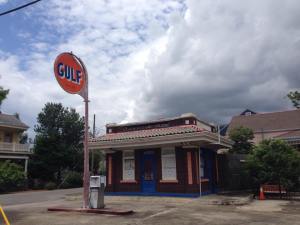
How the Irish Saved Civilization by Thomas Cahill
Image

I highly recommend this novel for anyone enjoys learning about ancient European history. Cahill’s account of Irish scribes and their efforts to save books from being lost forever is very intriguing, to say the least…
When so many are lonely a…
Quote
Winter’s Bone by Leah Grace O’Brien
One of the most compelling scenes in Debra Granik’s film Winter’s Bone depicts the film’s protagonist, Ree Dolly, being dragged away into the night by a group of brutal women. Her relentless journey to find her missing father has brought her through the cold hills of her small town and into the back yard of rusted cars and chicken coops. Methamphetamine has stolen away almost everything from the rural community of southern Missouri. It has decimated the men in the town, and turned family against family. Winter’s Bone pits the destructive force of drug addiction against the resiliency of the human spirit.
Ree struggles and fights to tear herself away from the tangle of arms and hands that engulf her. While being punched and slapped, the women force her into a haunting gray barn on a bleak winter evening. Her screams echo into the cold night. A concussion of thunder rumbles across the sky, low and faint. A glowing florescent light hanging overhead and rusty metal chains hanging on the wall project a feeling of claustrophobia and doom.
As Ree gains consciousness she finds herself surrounded by a sea of blurry faces. Once again the feeling of claustrophobia sets in. The dour faces of the townsfolk are marked by creases and old lines. Their dead eyes peer down at the young woman with a hostile uncertainty. Their lost battle with drug addiction and the poverty they have endured has stolen almost everything away from them. Ree has found herself on the receiving end of their brutality. She stares straight ahead and is told by the film’s most paradoxical character Merab, “You was warned. You was warned nice and you wouldn’t listen. Why didn’t you listen?” Ree spits out a broken tooth as an answer and stares thoughtfully down at her hand. She is now surrounded not only by women but by local men in flannel shirts, jeans, and worn baseball caps. Ree looks up and as the light hits her face she is met with a stroke of a hand to her hair. In a callous attempt for an answer, one of the younger women named Megan asks Ree in a voice filled with pity and sarcasm,
“What are we ever gonna do with you baby girl?” Ree doesn’t even balk. She replies with a breathtaking nonchalance.
“Kill me I guess… or help me.” she says. Only a truly resilient person could respond with such an unflinching reply. As she slouches on the dusty floor the sound of a car door opening catches the attention of some of the men and they take a step back. A large, aged man with a penchant for western clothes appears through the archway of the door. The upper half of his body is darkened by the shadows in the barn but his hard face and white beard become visible once he steps into the light. His presence is noted by everyone in the room and the men take a further step back. Thump Milton walks to where Ree is sitting and stares down at her. She peers up at him with an alarmed expression and makes an effort to back further up against the haystacks but there is no escape. This is not the first time they have seen one another. Earlier in the day, Ree had gone looking for him at a cattle auction in town. His reputation for being elusive and formidable could not keep her away. Ree was hoping to talk to Thump about the disappearance of her father Jessup. She spotted Thump in the bleachers and called out to him. He got up briskly and walked away, causing Ree to follow him through a maze of steel fences and howling sows. Her chase led her to Thump’s barn where she found herself overcome by a vicious group of women who spotted Ree and became truculent and violent with her.
Thump stands in front of Ree, his towering body taking up much of the frame. His colossal cowboy hat casts a shadow across his face, adding to his threatening demeanor. Thump bends over to get a closer look at the damage that has been done to Ree’s face. He reaches out and with a large hand places his fingers around her lower jaw, examining her bloody face. Ree does not protest this gesture or try to get away. She looks up at him with a steely gaze. A deep gash above her lip which appears to be very painful does not make her wince. With a face that looks as though it could have been carved out of the side of a mountain and a voice to match, he says,
“You got something to say child, you best say it now.” The small crowd looks on with wan expressions. Ree replies confidently,
“I got two kids that can’t feed themselves yet. My mom’s sick and she’s always gonna be sick. Pretty soon the law’s gonna come taking our house and throwing us out to live like dogs.” A close up shot reveals Thump as he listens and considers. She goes on to tell him that if her missing father has done wrong he has paid the price for his mistakes. He says nothing as he meets her gaze through the florescent light. Thump lumbers away in a medium shot, powerfully dominating the frame. Their conversation represents the struggle between destructive addiction and the human spirit.
A dog barking in the near distance signals the arrival of a vehicle. Merab, looking worried and weathered, gazes around the room at her comrades. The consensus seems to be that Ree’s uncle Teardrop has arrived searching for his niece. One of the men replies while walking away from the small crowd,
“I ain’t gonna be here naked with that motherfucker coming.” He is unarmed and chooses to flee. He walks away and everyone standing in the barn exchange alarmed glances. In a powerful frame hinged in uncertainty, an old garage door opens swiftly and a slender man with a switching left hand enters. The door goes all the way up revealing Teardrop’s deadpan stare. Teardrop does not waste any time asking for the whereabouts of Ree. He makes his way into the barn and is met by two reluctant men who make a weak effort to block his path. Teardrop glances around the dimly lit room and catches a glimpse of his injured niece. He asks the men if they hit her. Merab chimes in again with her gravely voice,
“He never. No man here touched that crazy girl. I put the hurt on her. Me and my sisters, they was here too.” The camera illuminates the uncertain expressions of the women in the room. Ree is seen sitting on the floor, her arms wrapped around her knees. The sound of Thump’s heavy boots approaching causes Ree to turn her head in his direction as he lumbers forward to meet Teardrop. The lighting in the barn is dim where the two men stand to face each other. The crowd looks on in silence. Teardrop regards Thump with the same stony expression as the others. He asserts in a self-assured voice,
“What Jessup done was against our ways, he knew it, I know it. I ain’t raised no stink at all about whatever became of him. She ain’t my brother.” The camera closes in on the startled faces in the room. Ree looks around the room, her hands folded over her knees. Teardrop continues, “She’s about the closest family I got left so I’ll be collecting her now, carrying her outta here to home. That suit you Thump?” Thump pauses before explaining to Teardrop very firmly that if Ree is to cause any kind of trouble it will fall on her uncle. Teardrop accepts his fate and approves of the transaction. Thump turns to the small crowd and says, “You boys give her a hand and put her in the truck.” A few of the bedraggled men lift her off of the floor and she lets out a groan of pain. She cannot stand on her own due to her bodily injuries and has to be propped up and helped out of the barn. The men place her gently into Teardrop’s Chevy and he starts the truck up with a rumble and they drive off into the night.
Blackness has swallowed the night as Ree and Teardrop make their way down a dark country road, away from the barn and her perpetrators. It is cold and silent. Although Ree has been saved by her uncle, her safety is still elusive. Her relationship with Teardrop is fractured, and she is still unsure of his motives. Just days before he had held out a bag of methamphetamine in her face and offered it to her. With the bag just inches from her face, she held her head back and refused to take it. The act was utterly brave. Ree looks sad as she sits in her uncle’s truck. Faint light from dashboard of the pickup illuminates their pensive faces. A deer antler hangs from a rear view mirror. Teardrop pulls his truck off to the side of the road and produces what looks to be a rag. He holds it between his knees and tears it up into smaller pieces. A profile shot reveals Ree’s scratched face. Teardrop says,
“Chomp down on that ’till the blood lets up.” In a gesture of concern, he hands her the handkerchief to put in her mouth. She bites down on it and keeps in in her mouth. Little dialogue ensues and when it does Teardrop tells Ree softly,
“Even if you find out, you can’t ever let me know who killed him.” He goes on to tell her that her father could not face a ten year prison term and had turned information over to the police that would eventually come back to haunt him. “You and me now.” Teardrop says as he turns his face towards his niece, a ribbon of cigarette smoke floats in the darkness. She regards the statement with silence, removing the cloth from her mouth. Her swollen and bruised face makes it difficult to talk even if she wanted to. In an unexpected gesture, she reaches over and squeezes her uncle’s shoulder. Ree has seen a shift in her uncle’s behavior, and although there has not been a sea change, Teardrop has shown her his humility. Her empathy for him is evident in her touching him, something she has not done at all throughout the film. His conversation with her is an honest one and he lets her know in his own way that he will be looking after her from that point on. A bridge has been built between them, and although it is not a secure one, it will help mend the damage that has been done to both of them. Ree looks over to her uncle and the hard expression she has carried throughout the film softens. Teardrop starts up the truck and they drive away to Ree’s humble cabin in the woods. Getting on with practical things like Ree taking the handkerchief to her bloody mouth shows the resilient strength her and her uncle exhibit just to survive the present moment.
In the final scenes of the film, Teardrop decides to visit the small cabin to check on his nieces and nephew. He approaches while Ree and her younger sister Ashlee Dawn take fresh laundry down from a clothing line. Their mother Connie, who is severely depressed and mute, sits and folds laundry. She sees Teardrop and a slight smile appears on her face. A gentle breeze lifts a blanket revealing Ashlee Dawn’s smiling face, toothless in its charm. The middle child named Sonny rolls back and forth on his skateboard in the front yard. Their uncle walks across the yard, holding a small, red flannel bundle in his left hand. He calls for Sonny to come closer. The family regards him with curiosity and move closer to him as he nears. Teardrop says hello to little Ashlee Dawn and Sonny walks over to see what is inside the cloth. They gather around their uncle as he bends down to reveal two baby chicks. Sonny and Ashlee carefully remove the chicks from Teardrop’s hands and gently hold them close to their chests. The children collectively thank their uncle and move towards their front porch to sit. Ree stands close to the clothesline and smiles at her uncle. The consequences of methamphetamine addiction has scarred Ree, her family, and their community. Her tenacity and resilient spirit enabled her to survive the harrowing search for her father with dignity intact. The end of Ree’s journey signifies a new beginning for her and her family.
Congress Street by Leah Grace O’Brien
There once was a time when I drank beer in the shower and listened to Lady Day on the busted old record player it wasn't romantic or interesting being poor hardly ever is unless you have a good imagination and know how to get what you want but I lacked talent when it came to such things and couldn't even barter a new shower faucet from the ancient handyman who lived on the top floor

